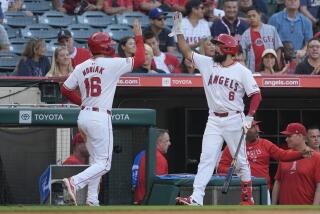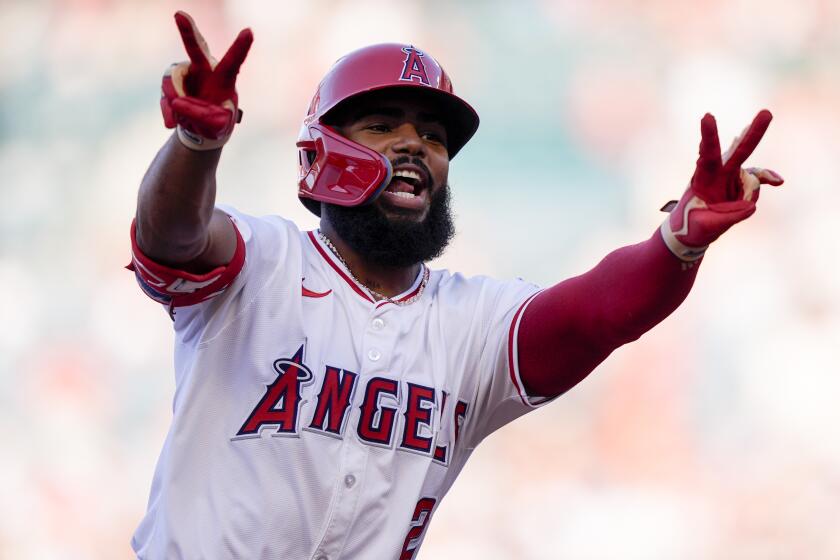McClure Is King of Couch : Reliever Takes It Easy, but Not on Hitters
- Share via
Bob McClure is a couch potato. Not your average flop on the sofa and waste a Saturday in front of the TV variety, but a serious, dedicated one who considers his inactivity an art form.
This is not just the passing whim of another flaky left-handed pitcher who’s trying to impress his buddies in the clubhouse. The Angel reliever and his best friend, Dave Downing, have been refining this science for more than 20 years. And, after compiling notes for more than 10 years, McClure and Downing are writing a textbook on the subject.
They even have a patent on a line of inactive leisure wear. Really.
McClure calls it “rotting,” and when he’s not twirling curveballs past American Leaguers, he’s buried in this sport he truly loves, one he contends is really this nation’s favorite pastime.
To understand the nuances of rotting, you’ve got to hear McClure tell it because, well, the book hasn’t been published yet. So snuggle down into your sofa--sitting is allowed but frowned upon--and bone up on the lowdown.
Who knows, you may already be a master rotter without knowing it.
First, the definition, according to McClure.
Rotting: Getting parallel; the art or science of doing nothing while looking as if you are doing nothing.
“We wanted to erase the guilt people seem to feel about relaxing,” McClure said. “Too many of my friends could not rott--it’s always spelled with two T’s by the way--without guilt. They felt they had to do something constructive.
“We developed rotting so now they are, in fact, doing something. You advance by logging rott time and you move up in degrees, sort of like in karate. You start out at the green level, you know, sort of a rookie, and you wear a green robe or something.
“If you’re really dedicated, you can become an ultimate master rotter. Then you get a black robe with gold tips.”
Sounds easy, but dedication is required. One must master the moves, or positions, and have lots of free time. And the parameters of what constitutes a legal rott are well defined.
“Let’s say your first day is Saturday,” says McClure, who never so much as cracks a smile during the explanation. “If you get up on the couch and watch football all day and don’t leave, except to go to the bathroom or to go to bed at night, you’ve accomplished a minor rott.
“If you return and make it through Sunday, that’s a major rott.
“Now, if you make it all the way through ‘Monday Night Football,’ that’s a coma rott.
“And, if you can hang out all the way to ‘Thursday Night Football,’ six full days, that’s a death rott.
“There’s only been two documented death rotts, by myself and Dave.”
But just lying there for the better part of week isn’t enough. You’ve got to throw in a few maneuvers:
--The prenatal rott: “You have your back to the TV and you peek at it over your shoulder. This is a good one when you just can’t lay on one side any longer.”
--The sailor rott: “Your eyes are at half-mast. This is a good one when you’re in the second stage of a major rott.”
--The possum rott: “One eye is buried in the pillow and the other is open just enough to let the light of the TV in.”
And there are duo moves, such the tier rott, in which one guy lies on the floor below the guy lying on the couch. And there are group rotts and rott-a-thons.
Defining and refining a new sport takes a great deal of time, not to mention a serious lack of effort. McClure knew all along it would be a rottin’ job, but somebody had to do it.
The thing is, Bob McClure is tough on hitters. Otherwise, he wouldn’t have all this time to lie around and rott.
The Angels have asked him to ply his trade often but in short spurts. McClure is a specialist, a role player. He comes in to face a left-hander or two, or hold a runner close with his good move to first base if the Angels can’t afford a stolen base.
He’s No. 3 on the team in number of appearances, 30, but he has fewer innings, 26 2/3, than anyone else on the Angel staff except Rich Monteleone, who spent almost two months in the minors but already has pitched 25 2/3 innings.
He has been on the mound for more than two innings just twice this season. Eight times, he has thrown five or fewer pitches. Fourteen times, he has needed 10 or fewer.
But McClure has made the most of his brief stints. He allowed just one earned run in his first 17 appearances, has a 2.03 earned-run average and a 3-1 record with three saves.
“He’s got the kind of arm that doesn’t take long to get ready,” Manager Dour Rader said. “So we don’t have to abuse him by getting him up and down, up and down. He’s done a great job.”
And, maybe just as important, McClure graciously accepts this abbreviated role.
“I’m very happy to be contributing to a winning club,” he said. “That’s my role and that’s fine with me. If we weren’t in a position to be where we are . . . I don’t know. But it’s easy to be satisfied when you’re winning.”
McClure has not always been a get-one-guy specialist. He has spent parts of 15 seasons in the majors, including a stretch with Milwaukee when he started 67 games in three years.
“If you would have asked me 15 years ago if it were hard to stay mentally and physically prepared when you’re pitching to just a couple of hitters every few days, I’d have said, ‘Yes!’ ” McClure said. “But it’s a learning process and I’m at the point now where I can get ready to come in with just five or six pitches in the bullpen.”
McClure has made some contributions in the clubhouse, too. He’s not exactly a team leader, but he is one of a number of new Angels who have revived a sense of camaraderie on the team.
They didn’t set out to do it and, if they had, it probably would not have worked. In the past, the clubhouse has been a morgue, especially after games.
These days, however, a lot of players, led by a nucleus of McClure, catchers Bill Schroeder and Lance Parrish and pitchers Greg Minton and Bert Blyleven are sitting around in their underwear hours before the game and long after.
“Sometimes, at home, my wife will get on me about it,” McClure said. “She’ll say, ‘You were in there for an hour and a half after the game.’ But I try to explain to her that I could take a line drive off my elbow tomorrow. I want to enjoy this while I can.
“People ask you what you’re going to miss when you leave the game, and of course there’s the competition. But my first response would be the camaraderie. Going through the winning and losing together. Helping each other through the tough times. The heartbreak and the laughter.
“These are special times.”
All things considered, it’s pretty remarkable that McClure ever made it to the majors. He had a troubled childhood and was living on his own by the time he was a junior in high school.
“I was a punk, you know, fighting all the time, hanging around with the wrong crowd,” he says. “I was the kid your mom told you to stay away from.”
There were lots of factors contributing to his adolescent problems, but McClure doesn’t want to detail them.
“Someday, after I retire, maybe I’ll tell the whole story,” he says.
By the time he finished high school, he had given up sports--he lettered in football and basketball as well as baseball at Terra Nova High School in Pacifica, Calif.,--and was working full-time for the phone company in San Francisco. He decided to give school, and sports, another shot, though, and enrolled at San Mateo, a junior college, where he became an all-state, All-American pitcher.
A Dodger scout named Ray Perry developed a rapport with the rebellious youth who still carried a log-sized chip on his shoulder and figured his talent might outweigh his problems with a little maturity.
“Ray thought that stuff was all behind me,” McClure said. “He was going to give me a chance. He told me the Dodgers were going to draft me, give me a $25,000 signing bonus and send me to double-A ball.”
But Perry died before the draft. And after the Dodgers selected McClure the third round of the free-agent draft in 1973, another scout told McClure he would be sent to the rookie leagues and offered a $5,000 bonus.
“For a kid who had been living on his own as long as I had, $25,000 seemed like a fortune,” McClure said. “But I’d have gone to Timbuktu for a thousand bucks for Ray. But this guy comes in and says to heck with what Ray promised me.
“I told him to (get lost).”
Five months later, before the secondary phase of the free-agent draft, scouts from both San Diego and Kansas City called McClure.
“I asked the first guy (from Kansas City) where he was and he said it was about 40 minutes away from where I was living,” McClure said. “Then I talked to the other guy and he said he was about an hour and 10 minutes away. So I called the first guy back and said I’d be over in 45 minutes.
“I didn’t know anything about either team or organization. I just wanted to get in a uniform and prove to the Dodgers I could play.”
The kid with something to prove carved out a life in the majors. He picked up a victory over the Angels during the 1982 American League championship series and went on to the World Series with the Brewers that year.
He’s committed to playing in another World Series this year, but he’s also looking forward to the off-season, when he’ll be satisfied with leaving a lasting impression in his sofa.
More to Read
Go beyond the scoreboard
Get the latest on L.A.'s teams in the daily Sports Report newsletter.
You may occasionally receive promotional content from the Los Angeles Times.






